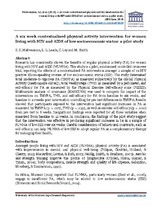A six week contextualised physical activity intervention for women living with HIV and AIDS of low socioeconomic status: a pilot study

View/
Date
2018Author
Mabweazara, Smart Z.
Leach, Lloyd
Ley, Clemens
Smith, M.
Metadata
Show full item recordAbstract
Research has consistently shown the benefits of regular physical activity (PA) for women living with
HIV and AIDS (WLWHA). This study is a pilot, randomised controlled crossover trial, reporting the
effects of a contextualised PA intervention amongst a sample of 21 HIV positive Xhosa-speaking
women of low socioeconomic status (SES). The study determined total moderate-to-vigorous PA
(TMVPA) as measured subjectively by the Global Physical Activity Questionnaire (GPAQ), total
weekly steps (TWS) as measured by a pedometer, and self-efficacy for PA as measured by the
Physical Exercise Self-efficacy scale (PESES). Multivariate analysis of covariance (MANCOVA) was
used to compute the impact of the intervention on TMVPA, TWS, and self-efficacy for PA from
baseline to six weeks, and baseline to 12 weeks post-intervention controlling for pre-test
differences in TMVPA. Results showed that participants exposed to the intervention had
significant increases in PA as measured by TMVPA (p = .027), TWS (p = .032), as well as exercise
self-efficacy (p = .000) from pre-test to 6 weeks. Insignificant findings were reported for all three
variables when measured from baseline to 12 weeks. In conclusion, the findings of the pilot
study suggest that the intervention was effective in producing significant increases in PA in a
sample of PLWHA of low SES over six weeks. Careful consideration of behavioural constructs,
such as self-efficacy, can help WLWHA of low SES to adopt regular PA as a complementary
therapy for managing their health.
